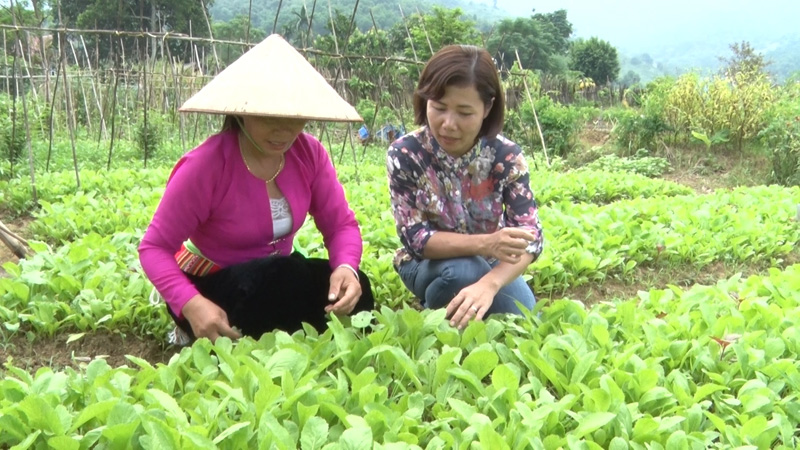
(HBO) - Growing vegetables under international standards without using pesticides or chemical fertilisers is a sustainable direction for farming households in Luong Son district, generating higher and more stable incomes.
After a decade of development, Luong Son organic
vegetable brand has become popular among consumers in Hoa Binh and Hanoi. With
over 200 ha of land and more than 200 tonnes of fruits and vegetables each year,
Luong Son has boasted the largest organic vegetable farming area in the
province.

Photo: Farmers in Hop Hoa commune, Luong Son
district, grow organic vegetables meeting food hygiene and safety standards.
Phung Thi Lan, Chairwoman of the Farmers' Association
and head of the district’s organic production group, said since late 2008, with
the support of the Danish-funded Agricultural Development Denmark Asia (ADDA)
project and the North of Vietnam College of Agriculture and Rural Development
in Xuan Mai district, Hanoi, the district has launched an organic vegetable
farming project in the communes of Hoa Son, Nhuan Trach, Hop Hoa, Thanh Lap, Cu
Yen, Tan Vinh and Luong Son town with an aim of creating more livelihoods for
poor women.
After a decade, it has become an outstanding
model for high-quality vegetable cultivation with little impacts on the
environment. It is significant to the district’s agricultural restructuring
scheme, thus raising incomes for local farmers, establishing a specialised farming
area for production in value chain, and supplying safe farm products to the
market.
In order to produce standard organic fruits and
vegetables, Luong Son farmers must take a three-month technical training course
and be granted certificates of organic vegetable farming. As many as 1,750 farmers
were trained and received such certificates from 2008 to June 2018.
Unlike conventional vegetable growing, land for
organic vegetable farming is zoned off and prevented from external
contamination via tests and buffer zones.
The total area of organic vegetable cultivation
in Luong Son has expanded to over 22ha, nearly 12ha of which meet international
standards. About 16 tonnes of safe and quality organic fruits and vegetables are
supplied to the market each month. Most of Luong Son organic fruits and
vegetables will be sold to shops and supermarkets in Hanoi via VinaGap, Trang
An and Tam Dat companies, bringing 3.4 billion VND in revenue per year./.
Dao Village’s honey – a product certified with a 3-star OCOP (One Commune One Product) rating by Thong Nhat Agricultural Cooperative in Dao Village (Hoa Binh City) – is highly regarded by consumers for its quality, richness, and variety in packaging. The distinctively sweet taste of Dao Village’s honey leaves a lasting impression on anyone who has tried it.
In alignment with Project No. 07-DA/TU, issued by the Hoa Binh provincial Party Committee on November 1, 2021, Lac Thuy district has actively promoted investment and supported the sustainable development of its industrial and handicraft sectors during the 2021–2025 period. Alongside this, the district has remained committed to preserving and revitalising traditional craft villages.
Located in the northern part of Lac Thuy district, with a temperate climate and fertile soil, Phu Thanh commune has great potential and advantages in growing tea. The long-standing experience, combined with strict adherence to organic farming practices in the tea gardens, ensures that the dried tea products from Phu Thanh and Lac Thuy as a whole are sold out immediately upon production, providing a stable and prosperous life for the local people.
Amid efforts to streamline the administrative apparatus, Hoa Binh province has intensified measures to address challenges in land clearance, resettlement support, and infrastructure investment, aiming to speed up the progress of key projects.
Hoa Binh province has posted an unprecedented economic growth rate of 12.76% in the first quarter of 2025, marking its highest quarterly performance to date and positioning it as the second fastest-growing locality in the country, trailing only Bac Giang province.
Under current regulations, products in the One Commune – One Product (OCOP) programme that are rated three stars or higher must undergo re-evaluation every three months. However, in reality, some of these products fail to consistently meet the required standards, raising concerns about the sustainability of their OCOP certification. This underscores the urgent need for producers to enhance product quality and gradually develop their OCOP products into strong, marketable brands.



